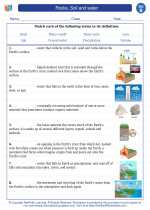Soil
Soil is a complex mixture of minerals, organic matter, water, and air that forms the top layer of the Earth's surface. It is essential for plant growth and provides a habitat for a variety of organisms.
Composition of Soil
Soil is composed of mineral particles, organic matter, water, and air. The mineral particles are classified into three main categories: sand, silt, and clay. The proportions of these particles determine the texture of the soil.
Functions of Soil
Soil serves several important functions:
- Supporting plant growth: Soil provides physical support, nutrients, and water to plants.
- Filtering and purifying water: Soil acts as a natural filter, removing contaminants from water as it percolates through the soil layers.
- Providing habitat: Soil is home to a diverse range of organisms, including bacteria, fungi, insects, and small animals.
- Recycling nutrients: Soil decomposers break down organic matter, releasing nutrients that can be used by plants.
Formation of Soil
Soil formation is a slow process that involves the weathering of rocks, the decomposition of organic matter, and the action of living organisms. Factors such as climate, parent material, topography, and time influence the formation of soil.
Soil Conservation
Soil is a valuable resource that can be depleted or degraded through poor land management practices. Soil conservation aims to protect and preserve the quality of soil for future generations. Techniques such as contour plowing, terracing, and crop rotation help prevent soil erosion and maintain fertility.
Study Guide
When studying soil, it is important to understand the following key concepts:
- The components of soil and their roles in supporting plant growth.
- The factors influencing soil formation, including weathering, organic matter decomposition, and biological activity.
- The importance of soil conservation and sustainable land management practices.
- The different types of soil and their characteristics, such as texture and fertility.
Understanding these concepts will provide a strong foundation for grasping the significance of soil in the natural environment and its vital role in supporting life on Earth.
Happy studying!
.◂Science Worksheets and Study Guides Second Grade. Rocks, Soil and water
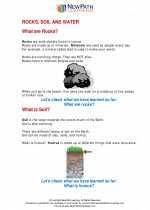
 Worksheet/Answer key
Worksheet/Answer key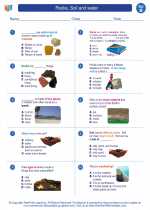
 Worksheet/Answer key
Worksheet/Answer key
 Worksheet/Answer key
Worksheet/Answer key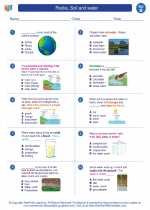
 Vocabulary/Answer key
Vocabulary/Answer key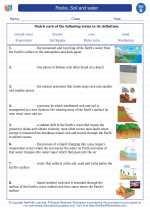
 Vocabulary/Answer key
Vocabulary/Answer key